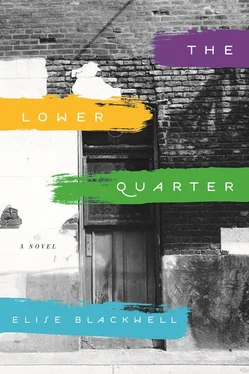And so there was also this for Johanna: a loss of control and thus fear.
When a check arrived from the artist couple for her final work on the husband’s pieces, she experienced a vague disappointment. If he had stopped by with an envelope of cash, then she might have seduced him. An act of control and a small act of revenge against Clay, against Eli, against her situation. Would she have done that? Probably, but her destructive impulse was not strong enough to survive the additional step of calling the man and arranging an encounter. It would have needed to be easy. Peter across the street crossed her mind, but he had done nothing wrong. She felt compunction there that she would not have felt toward the unsavory married artist. There was also this: She was done with men she might actually like. They led nowhere happy, either.
So she channeled her anger into her feet and walked and walked and walked. After two days of walking, she felt considerably better, and her pace slowed a bit. She included more stops: a cup of coffee, a bottle of lemonade, a postcard that caught her eye. She lingered to watch some renovations in the 600 block of Chartres Street, at the carriage house where six-foot-tall Storyville brothel owner Rose Arnold had lived in the 1920s. History called her “Aunt Rose,” but Johanna doubted anyone in her line of work deserved a term of benign familiarity. If her girls called her “aunt,” it was probably out of fear or loathing, maybe jealousy — the desire to change places. Her stops lengthened: an hour in an exhibit on the Louisiana Purchase at the Cabildo, pre-Mass music at the Cathedral, lunch near the window of the newly reopened but mostly empty Muriel’s.
It felt in wisps as though the city remained vacated so she could tour its history. At other times it felt like an off-hours movie set, though Johanna knew full well that the world was not arranged for her. She had never allowed herself more than a minute of magical thinking. People are good or bad; the world does not care.
Walking behind the Cathedral, Johanna noticed a sign announcing the reopening of a bookstore famous, she knew, for the author who had once lived there. Damage to the outside of the building was still evident, and the walls inside were stained. Johanna walked through the tight cases and read the book titles that lined the walls.
“All new?” she asked the man behind the counter.
He shook his head. “We lost parapets and fixtures — and a lot of money by the end — but the books survived.”
Johanna’s vocation took over. “How on earth?”
“First, we were lucky. Then my wife took over. She’s her own force of nature.” His smile was gentle. “We found a contractor who was able to get in right away. He cleaned the air-conditioning ducts with bleach and got the air back on. Otherwise it would have been a tragedy of words and pages.”
Johanna asked him to recommend a book on French Quarter history, and he guided her by the elbow to a shelf. “You pick,” she said. “Three or so.”
Soon she was walking back down Decatur with her books, ready to take herself and her fictional history back inside, into the private space where she belonged. First, though, she stopped for a bottle of bleach, figuring that, if nothing else, the smell of it would help purify the place of her work, of her life. Then she would be ready to get back to that work, the work that was her life. A new client’s project would mark her return.
Eli
Though Eli had assumed the young man had intentionally avoided him at the auction, it was Gerard Fontenot’s son who had called him. Eli had picked up right away, without glancing at the incoming number, again assuming it was Johanna, who had not answered his calls all day. “Johanna,” he’d breathed into the phone, and the male voice on the other end had replied, “She’s safe.” It disconcerted Eli that this was almost how his last conversation with Detective Mouton had started.
“Don’t come here,” he’d said. “Let’s meet somewhere open.”
Clayton Fontenot had not seemed to mind his paranoia. “I hate the Hotel Richelieu anyway. Definitely won’t be going there again until they do something about the bar. And don’t even get me started on that thing they call the pool.” It seemed to Eli that Clay had gone out of his way to let him know he’d been to the hotel before, but he also knew from experience that there are as many false confessions as real ones. People will cop to all sorts of terrible deeds, but they hate to admit those sins they’ve actually committed.
Now they sat on a bench facing St. Louis Cathedral, between groups of pigeons and their human equivalents. A caricaturist working on the ground nearby occasionally hawked his goods to a passerby, but the skinny kids in hoodies walking by didn’t look like they had money to spare for a sketch. The other sounds were indistinct, and even those sources nearby sounded as though they were crossing a distance.
“I don’t really have time to determine whether you are a good guy or a bad guy,” Fontenot’s son said.
Eli was debating whether to argue that he was a good guy or to tell this guy to go to hell when Clay held up his hand, pressing back his response.
“I did my research, don’t get me wrong. If I didn’t think you were a good guy, at least where Johanna is concerned, I wouldn’t be here. But I don’t have time to test my conclusions. So I’m going to hope you are a good guy, but I’m not going to tell you anything you’ll find useful if you’re not. As I say, I don’t have a lot of time. What you need to know is that Johanna will not be safe if she has the painting—”
“So people keep telling me.” Eli moved to speak more, and again Clay Fontenot pressed the air in front of them with his open hand.
“I know you know what I’m talking about. What I don’t know is whether you were the one who took it from her place. I’m guessing not.”
Pigeons approached and pecked at the ground near his feet, yet still the small noises they made sounded farther away. As loathed as they were, as dirty as they were considered, they were beautiful animals in their dozens of gray. No longer trying to speak, Eli just shook his head in response to the implied question.
“Either you did or didn’t, and either way, you may or may not be planning to get it back for her. First, you should know that you can’t. You don’t have those kinds of skills — trust me, I’m familiar with the security — and pretty soon you won’t even know where it is. Second, and maybe this is more important, Johanna can’t have the painting while other people want it.”
Eli had interviewed the wrong Fontenot, obviously, and wondered if that had been his own oversight or if he had been steered that way by Ted. “It isn’t even worth that much,” he said. “Not worth enough to account for all the drama.”
“You really don’t understand how people operate, do you?” Clay hooked an elbow over the back of the bench and opened his chest more fully toward Eli. “People are scum. They care about money, of course they do, but also pride and power and revenge. Even Johanna, you know, cares more about revenge than she’ll ever care about the likes of you or me.”
The sounds of the square rushed closer, as though they’d been held behind some barricade and then released en masse.
“It’s more complicated in her case,” Eli said.
Clay shook his head. “It’s more sympathetic, but it’s really not more complicated. What do you know about her?”
“I don’t want to know anything she doesn’t want to tell me. I have too much respect for her for anything else.”
“No, not respect,” Clay said, narrowing one eye as though sizing him for a suit. “You are in love.”
Читать дальше












